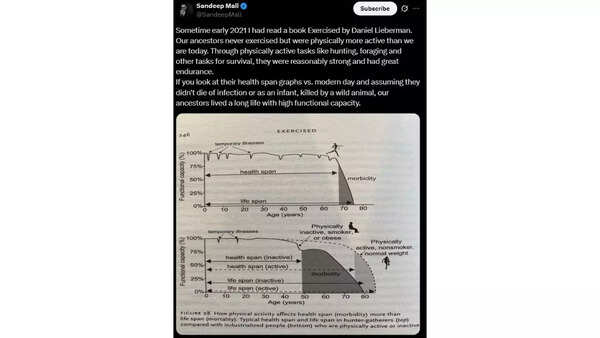Harvard research reveals: How a simple 21-minute walk a day may be healthier than hitting the treadmill
In an era dominated by intense fitness trends and misunderstood wellness goals, a Harvard evolutionary biologist challenges conventional wisdom. Dr. Daniel E. Lieberman argues that the human body evolved for energy conservation, not peak physical performance, suggesting that moderate movement, particularly walking, is more beneficial than high-intensity workouts.
According to Lieberman, the modern concept of "exercise" is a recent anomaly. Our ancestors engaged in physical activity for survival—hunting, foraging, and building—not for the sake of fitness.
"We have to do this weird thing called exercise, which is voluntary physical activity for the sake of health and fitness—something nobody did until very recently," Lieberman explains.
This perspective suggests that while exercise is important today, it wasn't a natural human inclination unless necessary.
Humans are biologically wired to store energy, a trait developed in unpredictable environments where food was scarce. This explains why many struggle with workout motivation; our bodies naturally resist unnecessary exertion.
 *Source: X*
*Source: X*
The Natural Workout: Why Walking is Key
Lieberman emphasizes that walking is the most evolutionarily consistent form of exercise. Early humans walked vast distances out of necessity. Today, walking remains a healthy, low-impact activity. Simple habits like walking to the bus stop, taking stairs, or strolling during breaks align better with our biology than extreme routines.
The 21-Minute Formula: A Harvard Biologist's Prescription for Longevity
Lieberman critiques the fitness industry's focus on suffering for success. He advocates for moderation over intensity. Research indicates that just 150 minutes of moderate activity weekly—about 21 minutes daily—can reduce the risk of early death by 30%. He encourages consistent, enjoyable movement over grueling gym sessions, highlighting the significant benefits of small habits.

The Perils of Overtraining and Burnout
Social media often glorifies extreme performance, but Lieberman warns that this can lead to overtraining, injury, and burnout, particularly among young people pursuing unrealistic goals.
"The obsession with optimum performance is overrated," he states. "High performance is just achieving your goals and staying active—it doesn’t need to mean winning medals." He urges a focus on function and longevity rather than aesthetics or metrics.

Is Skipping a Workout Okay? The Harvard Perspective
Lieberman's evolutionary perspective offers relief from the guilt associated with missing workouts. If humans weren't designed for constant strain, rest is not failure but biological wisdom. He encourages a balanced approach: move regularly, but don't obsess. Understanding our ancestral lifestyles can free us from toxic fitness narratives, promoting a sustainable, guilt-free approach to health.
Dr. Daniel Lieberman’s research provides a compelling argument for rethinking our approach to movement. Effective exercise doesn't require extremes. Consistency, moderate movement, and enjoyment are key. Walking, resting, and listening to your body might be the most natural and healthiest choices.
Newer articles
Older articles
-
 5 smart tricks to instantly influence anyone (without being pushy), as per psychology
5 smart tricks to instantly influence anyone (without being pushy), as per psychology
-
 This new AI tool can help you book train tickets, get refunds and check details on IRCTC website and app
This new AI tool can help you book train tickets, get refunds and check details on IRCTC website and app
-
 Cancer could be detected 3 years before symptoms appear with a simple blood test; new study reveals
Cancer could be detected 3 years before symptoms appear with a simple blood test; new study reveals
-
 ESA reveals the first stunning images of an artificial solar eclipse created by Proba-3 satellites
ESA reveals the first stunning images of an artificial solar eclipse created by Proba-3 satellites
-
 Chess: 'My wife is way more attracted to me now' — Magnus Carlsen after record rating in freestyle
Chess: 'My wife is way more attracted to me now' — Magnus Carlsen after record rating in freestyle
-
 Don't worry about the outside world: Tendulkar's advice to Gill
Don't worry about the outside world: Tendulkar's advice to Gill
-
 NASA astronauts prepare ‘space sushi’ aboard the ISS in zero gravity during a heartwarming crew celebration
NASA astronauts prepare ‘space sushi’ aboard the ISS in zero gravity during a heartwarming crew celebration
-
 Amitabh Bachchan calls working with son Abhishek Bachchan his 'greatest blessing'
Amitabh Bachchan calls working with son Abhishek Bachchan his 'greatest blessing'
-
 Tait rues new-ball miss as Nissanka punishes Bangladesh
Tait rues new-ball miss as Nissanka punishes Bangladesh
-
 Twitter bans over 5 lakh accounts in India, here's why
Twitter bans over 5 lakh accounts in India, here's why